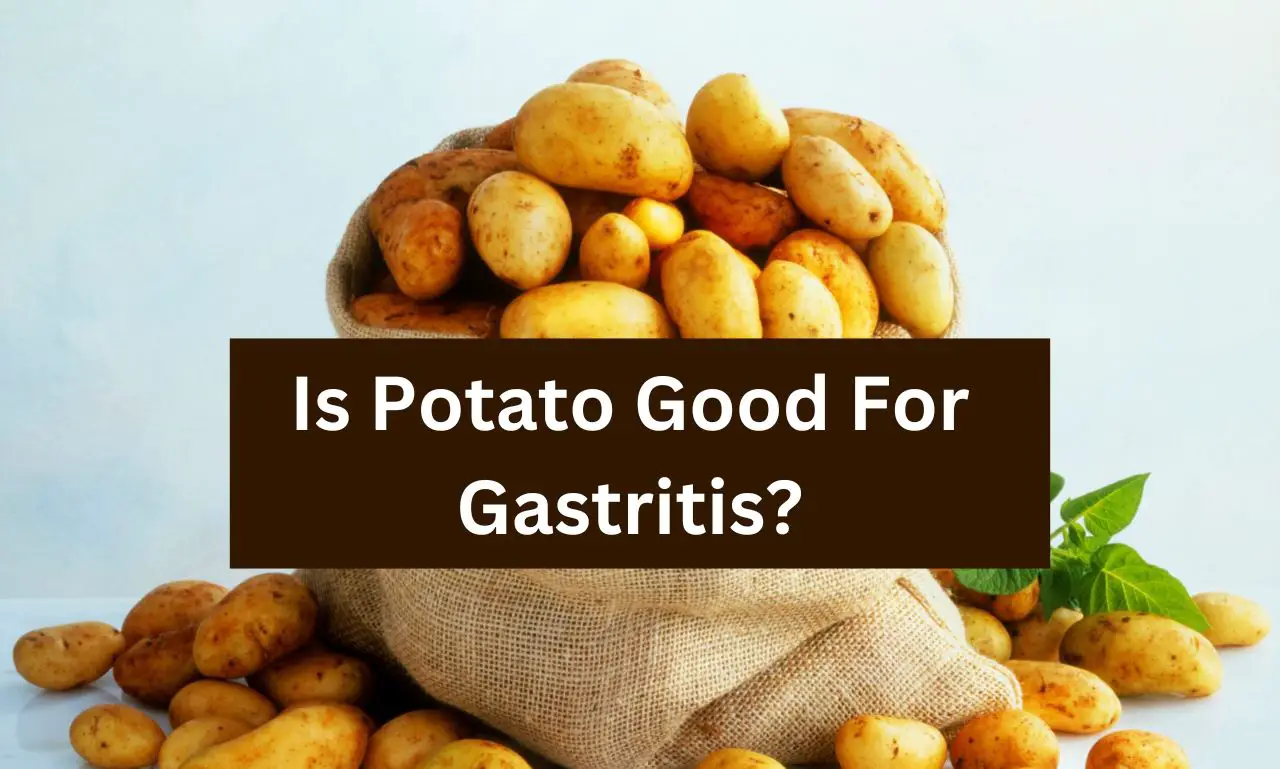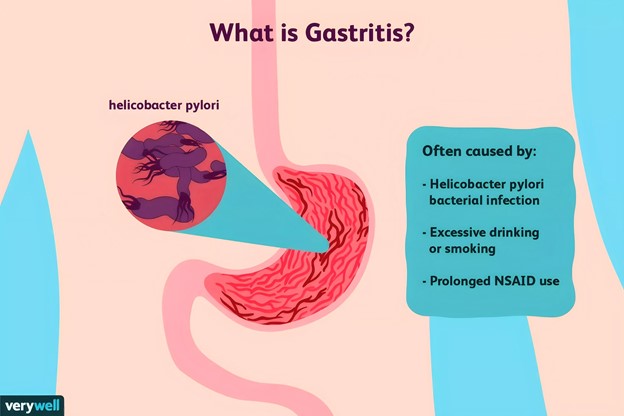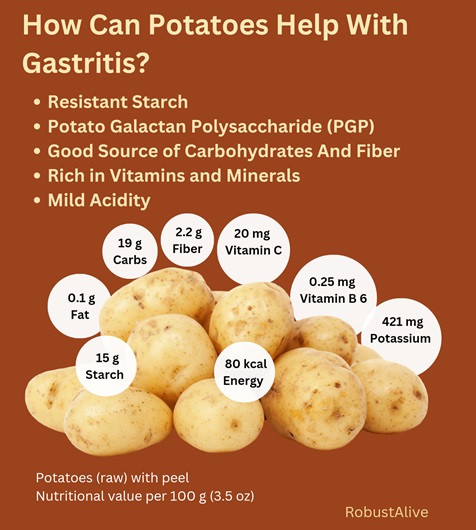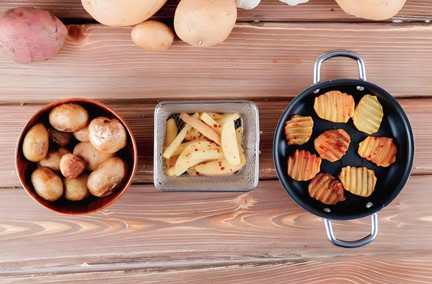Is Potato Good For Gastritis?

If you’re suffering from gastritis, you may wonder which foods are safe to eat and which can aggravate your condition. One food that often comes into question is potato which is a staple food in our daily life.
So, is potato good for gastritis?
Potatoes are generally good for gastritis as they contain galactan polysaccharide, resistant starch, fiber, vitamins, and minerals that can help alleviate gastritis. Choose gentle cooking methods like boiling, baking, and steaming, and avoid high-fat toppings with potatoes.
This article will explore why potatoes are good for gastritis and how to incorporate them into your diet for optimal health.
Is Potato Good For Gastritis?
Potatoes are a versatile and nutrient-rich food that can provide various health benefits and are generally considered suitable for gastritis.
They contain potato galactan polysaccharide, resistant starch, fiber, vitamins, and minerals that can help alleviate gastritis, reduce inflammation in the colon, and support overall health. You can consume one medium size potato in a day safely.
What is Gastric?
Gastritis is a common digestive disorder characterized by inflammation and stomach lining erosion. It can cause symptoms such as abdominal pain, bloating, nausea, vomiting, and loss of appetite. One of the leading causes of gastritis is the bacterium Helicobacter pylori, which can lead to peptic ulcers and even stomach cancer.

It may occur suddenly (acute gastritis) or slowly over time (chronic gastritis).
How Can Potatoes Help with Gastritis?
Here are some of how potatoes may help alleviate symptoms of gastritis:
-
Potato Galactan Polysaccharide (PGP)
Potatoes contain a compound called potato galactan polysaccharide (PGP), which has been found to help to treat gastritis, ulcers, and even cancers. A study published in the International Journal of Biological Macromolecules found that PGP could curb the growth of H. pylori, the bacterium responsible for causing gastritis.
-
Resistant Starch

Potatoes are also a good source of resistant starch, which can help reduce inflammation in the colon. When resistant starch reaches the colon, gut bacteria convert it to short-chain fatty acids, such as butyrate. These fatty acids can reduce inflammation in the colon, which may help reduce the risk of gastrointestinal conditions, including colorectal cancer.
-
Carbohydrates And Fiber
Potatoes are a good source of carbohydrates and fiber, which can help to soothe the lining of your stomach. When you have gastritis, your stomach lining becomes inflamed and irritated. Eating foods that are high in fiber and carbohydrates can help to reduce this inflammation and irritation.
-
Vitamins and Minerals
Potatoes are rich in vitamins and minerals, including vitamin C, potassium, and vitamin B6. These nutrients can help support your overall health and well-being.
-
Mild Acidity
Potatoes are mildly acidic, with a pH level of around 5.5. While this might seem bad for those with gastritis, it’s important to note that foods that trigger gastritis symptoms are often below the pH of 4.6. Therefore, potatoes are considered mildly acidic and unlikely to increase stomach acidity unless eaten in high quantities.
Lastly, talking to your doctor or a registered dietitian is essential to determine if eating potatoes is okay. Everyone’s dietary needs and restrictions are different, so it’s best to create a personalized plan that can help manage your gastritis symptoms and support your overall health.
-
Are Sweet Potatoes Good for Gastritis?
Sweet potatoes are also good for gastritis. They are a great source of vitamins and minerals, including vitamin A, C, potassium, and fiber. Like regular potatoes, sweet potatoes are also mildly acidic, making them a good choice for those with gastritis.
Additionally, sweet potatoes contain antioxidants, which can help to reduce inflammation in the body.
Who Should Avoid or Limit Eating Potatoes?
Potatoes can benefit many people with gastritis, but some should avoid consuming potatoes or limit their intake. So, avoid eating potatoes if you have the following conditions.
- Low carb diet or low starch diet
- Diabetics
- Potato allergy
- Kidney disease
People advised to follow a low-carbohydrate or low-starch diet should avoid or limit their potato intake as potatoes are high in carbohydrates and starch. Individuals with diabetes may also need to restrict their potato intake as it can cause a spike in blood sugar levels.
People with food allergies or sensitivities to potatoes should also avoid them. Symptoms of potato allergy may include itching, hives, swelling, or difficulty breathing.
Lastly, people with pre-existing medical conditions, such as kidney disease, may need to limit their potato intake due to the high potassium content of potatoes. Consuming too much potassium can be harmful to those with kidney problems.
Cooking Methods: Preparing Potatoes for Gastritis
When preparing potatoes for gastritis, choosing gentle cooking methods on the stomach is crucial. Here are some tips for preparing potatoes for gastritis:
- Boiling
- Baking
- Steaming
- Potato juice

-
Boiling
Boiling potatoes is a gentle cooking method that can help to preserve their nutrients. To boil potatoes, place them in a pot of water and bring them to a boil. Let the potatoes cook for about 15-20 minutes or until soft. Drain the water and mash the potatoes with a fork or potato masher.
-
Baking
Baking potatoes is another gentle cooking method that can be a good option for people with gastritis. To bake potatoes, wash and dry them, prick them with a fork, and place them in the oven at 400°F for about an hour. Once cooked, remove the potatoes from the oven and let them cool before peeling and mashing them.
-
Steaming
Steaming potatoes is another gentle cooking method that can help to preserve their nutrients. To steam potatoes, place them in a steamer basket for about 20-30 minutes or until soft. Once cooked, remove the potatoes from the steamer and let them cool before mashing them.
-
Potato Juice
Potato juice is beneficial for reducing acidity in the stomach and treating both acute and chronic nervous gastritis. Here is a recipe for making potato juice for gastritis.
To make potato juice, grate two to three raw potatoes and place them in a strainer over a bowl. Pour warm water over the potatoes and drink the resulting water thirty minutes before your primary meals. Alternatively, blend shredded potatoes with water and strain the liquid before drinking.
-
Seasoning
When seasoning your potatoes, avoid spices and ingredients that can irritate gastritis, such as black pepper, garlic, and hot peppers. Instead, consider using herbs and spices like basil, oregano, sage, and tarragon. You can add ginger and turmeric as they have stomach-soothing properties.
Also, add only a little salt, and avoid high-fat topping in your potato dish, which is unhealthy for you.
You can enjoy potatoes without aggravating your gastritis by using low-fat cooking methods and avoiding irritating ingredients.
Frequently Asked Questions (FAQs)
Is Potato Good For Stomach?
Potatoes can be good for the stomach due to their resistant starch content. This starch acts as a prebiotic and can help promote the growth of beneficial gut bacteria and treat constipation and irritable bowel syndrome.
Can I Eat Potatoes for Acid Reflux?
Potatoes are a good option to prevent acid reflux if prepared without high-fat toppings. However, avoiding high-fat potato products like french fries and potato chips is best, as they can cause stomach discomfort.
Can You Eat Eggs With Gastritis?
Yes, plain eggs can be a good source of protein to include in your diet if you have gastritis. However, avoiding fried or cheese-filled eggs and adding spices like pepper is essential, which may irritate the stomach lining.
Conclusion
In conclusion, potatoes are good for gastritis because they contain nutrients and compounds that can help soothe the stomach lining and reduce inflammation.
However, you should avoid potatoes if you have kidney disease, diabetics or allergies.
When cooking potatoes for gastritis, use gentle methods like boiling, baking, steaming, or juicing. Speak to a healthcare professional or dietitian to create the best diet plan for your needs.





